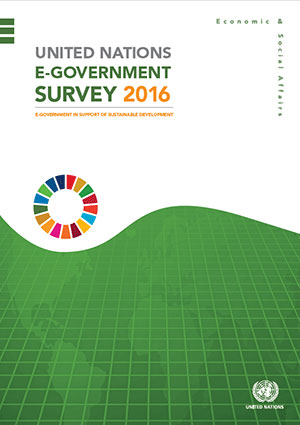|
 In
the ranking of countries in terms of E-government development published on July
29, 2016, which is prepared by UN every two years, Russia ranked 35th,
down from 27th position,
which it occupied in the previous ranking of 2014.In 2012 Russia has risen to
quite honorable 27th position due to dramatic improvement of its indicators
in comparison with 2010, when it occupied 59th position. In
the ranking of countries in terms of E-government development published on July
29, 2016, which is prepared by UN every two years, Russia ranked 35th,
down from 27th position,
which it occupied in the previous ranking of 2014.In 2012 Russia has risen to
quite honorable 27th position due to dramatic improvement of its indicators
in comparison with 2010, when it occupied 59th position.
The
fall in the overall ranking, as well as its growth in 2012, objective, understandable
and related to the dynamics of two sub-indexes - the telecommunication
infrastructure index and online services sub-index, which together with the human
capital sub-index form with the same weights composite index of E-government
development, on the basis of which UN builds the ranking.
Online
services index is based on the results of official government portals and web-sites
survey, which is held during the preparation of the next rankings. Since 2012
the rapid raising of Russia's position in this sub-index has taken place: from
68th position in 2010 it rose to 37th one in 2012 and to 27th
in 2014. Rapid progress in the first stage has been associated with transformation
of services in electronic form, the creation of a single portal of public and
municipal services, the disclosure of information on the activities of public
authorities on the official websites. At a second stage, this dynamic was
supported by the expansion of public services in electronic form and
implementation of a number of initiatives in the field of interaction with
citizens using ICT initiatives such as the “Russian Public Initiative”, the
publication of open data, creation of a single portal publishing information on
the development of draft legal acts by public authorities and their public
discussion.
In
2014 there was quite significant change of the UN methodology for the official
web-sites survey, in which the expanded criteria related to modern trends of E-government
development have been introduced (multi-channel and mobility, user-orientation,
provision of services in relation with the real-life situations, use of a wide
range of instruments for citizens' participation in the control and other
processes – e-participation). Open data and e-participation were seen as an important
part of e-government services (which we have traditionally understood more
narrowly - as the use of ICT for providing public and municipal services). As a
result, in 2014 ranking Russia gained 51% and 35% of the maximum possible value
in the last two of the four stages of the online services development (primary
and advanced information services, transaction and networking/integration
services). It was enough in 2014 to further grow in the ranking (the above-mentioned
trends were new to most countries than), but in the next two years under the
new parameters Russia has not made substantial progress. Other countries began
to overtake Russia and as a result in 2016 Russia dropped from 27th to
38th place in the online services index.
In
recent years, the country's leaders have begun a full-scale implementation of a
new generation of E-government technologies - digital government. It is no
accident that the first place in the ranking of the United Nations took the
United Kingdom, which has become an early adopter of digital public services,
and the top ten ranking in countries that have adopted and implementing
projects the digital transformation of its governance systems. The
possibilities that open up digital technology to the Government of the Russian Federation,
has recently been presented in the analytical report “Digital Government 2020:
Prospects for Russia”, prepared by the World Bank in cooperation with the
Institute of the Information Society.
It
is fair to say that the Ministry of Communications envisaged appropriate
activities in the above-mentioned new areas in the developed E-government System
project and other documents, however, the delay in their implementation, partly
due to the difficulty of financing, led to the loss of positions in this part
of the United Nations rankings.
Similar
dynamics is observed in the telecommunication infrastructure sub-index, which
is calculated based on five indicators collected by the International
Telecommunication Union (penetration of Internet, fixed and mobile telephony,
fixed and wireless broadband communication). High growth rates in 2008-2010 of
the telecommunication indicators, especially the Internet penetration, allowed
Russia to rise from 63rd position in the 2010 report to 30th
position in 2012 in the telecommunications infrastructure sub-index. In
subsequent years, the growth rate in the Russian telecommunications
infrastructure indicators declined and they no longer provide a further
progress in ranking. The other countries became to overtake Russia and in the
corresponding component of the UN index Russia dropped from 30th
position in 2012 to 33rd position in the ranking of 2014 and to the
38th position in 2016, which also determined the decrease in the
overall ranking. Reducing the rate of telecommunication indicators growth partly
related to the general economic situation, and in some part - with a delay in
the implementation of activities and projects to overcome the digital divide in
Russia (universal communications service for broadband access in towns with a
population of 250 and above was introduced only in 2014, there is also a delay
in the implementation of this and other measures). Some contribution to the
reduction of the position changes in the assessment method of number of mobile
users made. In recent years, Russia has become to take into account only active
subscribers (SIM cards), in accordance with the procedure of the ITU, which
reduced the value of this indicator.
|

